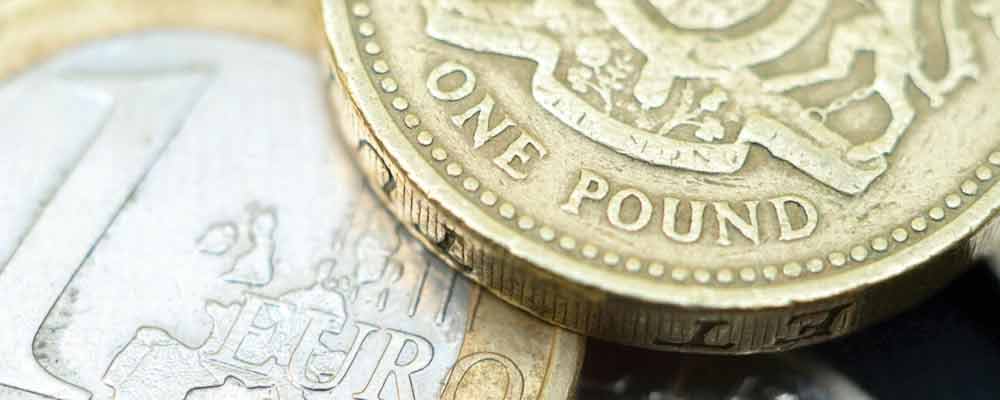- Pound Sterling (GBP) Exchange Rates Rebound – Traders take advantage of low trade weighting
- Euro (EUR) Exchange Rates Continue to Struggle – Bond yields fell significantly in Brexit aftermath
- Standard & Poor’s Cuts UK Credit Rating – UK now at AA
- GBP EUR Exchange Rate Predicted to Trend Narrowly – US Dollar weakness prevents larger Euro depreciation
GBP EUR Exchange Rate Holds Gains Today But Long-Term Losses Forecast
On Thursday morning the GBP EUR exchange rate edged higher to hold above 1.21. Even positive European ecostats have not been enough to encourage traders to buy in to the single currency.
Until the UK government has stabilised and confidence is restored in the leadership of the nation’s two main political parties, the Pound is likely to struggle to keep its head above water.
As it stands, Labour Leader Jeremy Corbyn is facing a serious leadership challenge with a massive vote of no confidence and the Conservative party has yet to put forward its main candidates for David Cameron’s replacement.
(Previously updated 29/06/2016)
After several days of marked depreciation, the GBP EUR exchange rate rebounded today. Whilst Sterling continues to hold a comparatively weak position, the absence of further losses will be welcomed in the financial markets. Improved market sentiment has seen the US Dollar cool, however, which is likely to limit Euro losses.
Standard & Poor’s Downgrade UK Credit Rating but GBP EUR Exchange Rate Edges Higher
Since the UK voted to leave the European Union the Pound has fallen significantly, with British stock values also depleting in the face of uncertainty.
Sentiment towards the UK has all but diminished, forcing Standard & Poor’s to lower the UK’s credit rating from AAA to AA.
‘In our opinion, this outcome is a seminal event, and will lead to a less predictable, stable, and effective policy framework in the UK,’ S&P said in a statement.
In addition, Moody’s changed the UK’s credit rating from ‘Stable’ to ‘Negative’.
‘During the several years in which the UK will have to renegotiate its trade relations with the EU, Moody’s expects heightened uncertainty, diminished confidence and lower spending and investment to result in weaker growth,’ the agency said.
Despite this, however, the Pound advanced versus nearly all of its major peers during Tuesday’s European session. This is likely to be traders taking advantage of Sterling’s comparatively weak trade weighting.
Whilst the Pound has made a moderate recovery versus most of its peers it continues to hold a position of weakness. Given the uncertainty regarding the UK’s political and economic landscape, and with potential delays to triggering Article 50, the Pound is very likely to resume depreciation in the short to medium-term.
The GBP EUR exchange rate was trading in the region of 1.2031 in the early stages of Tuesday’s European session.
GBP EUR Exchange Rate Strengthens amid Speculation ECB Will Step up Asset Purchases
In the aftermath of the UK’s Brexit vote, safe-haven demand caused developed nations’ bonds to surge in value. This reduced yields; a very big problem for the European Central Bank (ECB) and its massive quantitative easing programme.
The ECB already have a limited choice of available assets, so reduced yields could force the central bank into accelerating purchases.
‘It’s hard, in the near term, to make a very bearish case on quality European credit while the ECB is a major buyer,’ said London-based fund manager Stefan Isaacs. ‘They could step up their purchases if they need to.’
Many analysts predict that the UK’s Brexit will have a far more damaging impact on the Euro than the Pound in the long-term.
One of the major fears for investors is the prospect of contagion as disillusioned member states may call for their own referendums.
‘My opinion is that Sweden should follow Great Britain and first ask for a renegotiation in order to later hold a referendum on continued membership,’ wrote Jimmie Akesson, leader of the Sweden Democrat party Metro. ‘The European Union which Sweden voted for originally was more or less a free trade union, not the super-national monster it has become.’
Whilst the Euro softened versus most of its major peers, US Dollar losses will likely prevent any major depreciation.
GBP EUR Exchange Rate Forecast: Domestic Data to Have a Muted Impact
With sentiment driving the currency markets, domestic data is unlikely to have much of an impact on the GBP EUR exchange rate.
With that said, however, Wednesday’s German Consumer Prices data will be of interest to those invested in the single currency.
Markets will be focussed on the ongoing discussions between EU officials and UK officials. Some EU members want this to be a quick process, but the complicated nature of negotiations in this unprecedented situation means it is likely to take a considerable period of time.
During Tuesday’s European session the GBP EUR exchange rate was trending within the range of 1.1985 to 1.2071.



